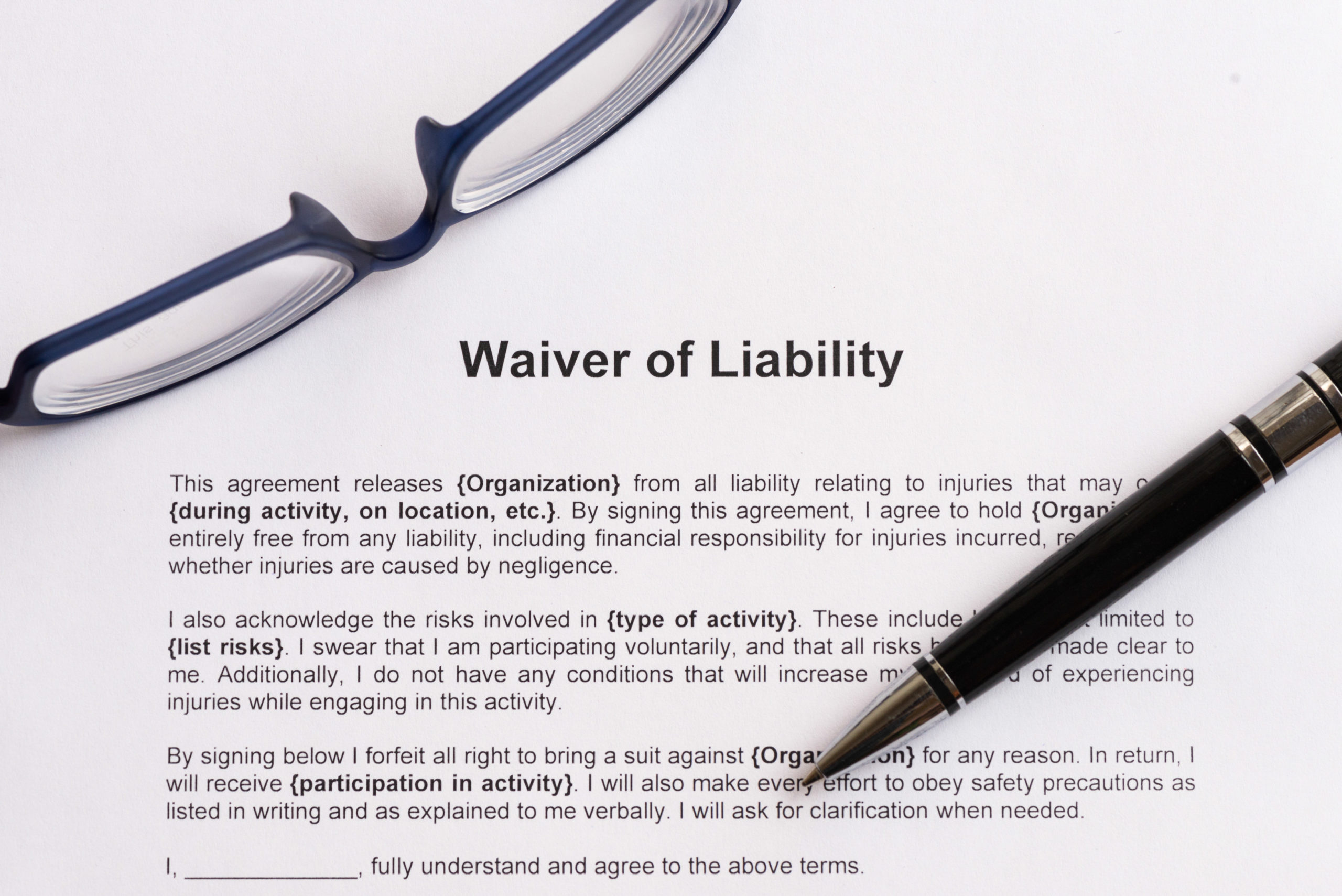Work With a Dedicated Attorney to Craft a Liability Waiver
What Is a Liability Waiver?
Is there a chance of risk in your plans or endeavors? Are you aware of all possibilities of harm or damage that could happen? Do you know why you have to sign all the documents before you? Before you sign anything, do yourself a favor and read all documents and clearly understand their contents and intentions. Not sure what a liability waiver is? Learn how to read between the lines, so you know your rights, and what rights you may give up by signing documents without reading them.
A liability waiver releases someone from accountability for damage or injury that may occur during a specific period. Once you sign a waiver, you essentially give up your right to hold the other party liable in the instance that something unfortunate happens to you. Generally, this is requested when an activity has the possibility of danger or harm, but it does not guarantee an ill-fated incident.
Liability waiver forms have several other names:
- Release forms
- Liability release forms
- Pre-injury release
- Assumption agreement
- Waiver
- Hold harmless agreement
- Injury waiver
- Release of liability
- Exculpatory agreement
- Waiver of liability
- Assumption of risk
- Release forms
- Indemnity agreement
Whatever name used, the party in possession of the document receives the same legal protection. In most instances, the waiver states that after signing the document, you lose the legal right to file a lawsuit against the other party or parties named on the form should you experience an injury or damage to your property during your time working with them.
A common misconception with signing a liability waiver is that you cannot sue if you become injured. The truth is that the rule has exceptions that you should know should you experience an injury.
The Top 5 Questions to Consider Regarding Different Liability Waivers
Most often, a party requests a signed waiver when you participate in activities at schools or daycare, at fitness centers, or in higher-risk activities such as extreme sports and certain types of volunteer work.
Here are five questions to keep in mind whenever you receive a waiver:
1. Do You Have to Sign a School’s Liability Waiver?
Usually, school waivers and releases of liability are not mandatory and may not be enforceable. However, you must read all documents before signing so you know if the waiver prevents your child from participating. You can then decide whether to sign it.
Always check the waiver’s verbiage to see if you can sue should your child become injured while participating under someone else’s care.
2. Can a Daycare Liability Waiver Be Enforced?
Daycare facilities want to limit their liability if a child becomes injured under their care, just like school-aged care. Still, in most cases, these facilities cannot legally waive liability.
In the event a child becomes injured or falls ill as a direct result of negligence, most courts hold caretakers accountable to prevent further neglect by other caretakers.
3. Can You Sue a Gym If You’re Injured?
Almost anytime you join a gym or fitness center, you have to sign a liability waiver should you accidentally injure yourself using the equipment. However, depending on the document’s wording, you may be able to file a suit. It all depends on the nature of the injury and its circumstances.
4. If You Attend As a Spectator at a Sporting Event and Become Injured, Can You Sue?
This one can be a little tricky to navigate, but did you know that the back of your entrance ticket is your liability waiver? By attending the event, you accept the risk of injury. Attendees cannot pursue legal action if they become injured, with very few exceptions.
5. Why Is There a Waiver for This?
If you volunteer or join a new group that requires this document, make sure you understand why before you sign a liability waiver. Often, if you are unfamiliar with an activity, a type of work or specific terminology, there may be hidden details that you did not consider. Before you sign the document, ask what specific objects, instances, areas or materials could be regarded as hazardous and weigh your decision on whether you want to participate.
When Should You Get Legal Help?
At their essence, liability waivers are a contract intended to release a party from being held accountable in the event of damage or injury. But can you sue after you sign a waiver? Treat liability waivers like a legally valid contract to hold up in court. This means that they must be signed, dated, etc.
However, waivers cannot ask you to engage in any illegal, unreasonable or unfair conduct. Some circumstances are always covered, so if you ever feel wronged or that you agreed under pretenses, it is best to seek legal assistance.
Additionally, if you need help drafting, reviewing or negotiating a waiver, an attorney can review the laws in your geographic area to be sure you have accurate representation in the agreement. Also, should you need to file a suit for damages referencing a liability waiver, an attorney can represent you in court.
Work With an Experienced Attorney
Should you ever find yourself charged with a liability waiver related claim, you have the right to legal representation to defend you in court. If you cannot pay for your own attorney, a court appoints you a public defender. If you can afford your own legal representation, hire an experienced private defense lawyer.
Get in contact with a personal injury lawyer near you by using our directory feature today.
Submit a request online or call us today at (866) 345-6784 to get in touch with an experienced lawyer in your area!

